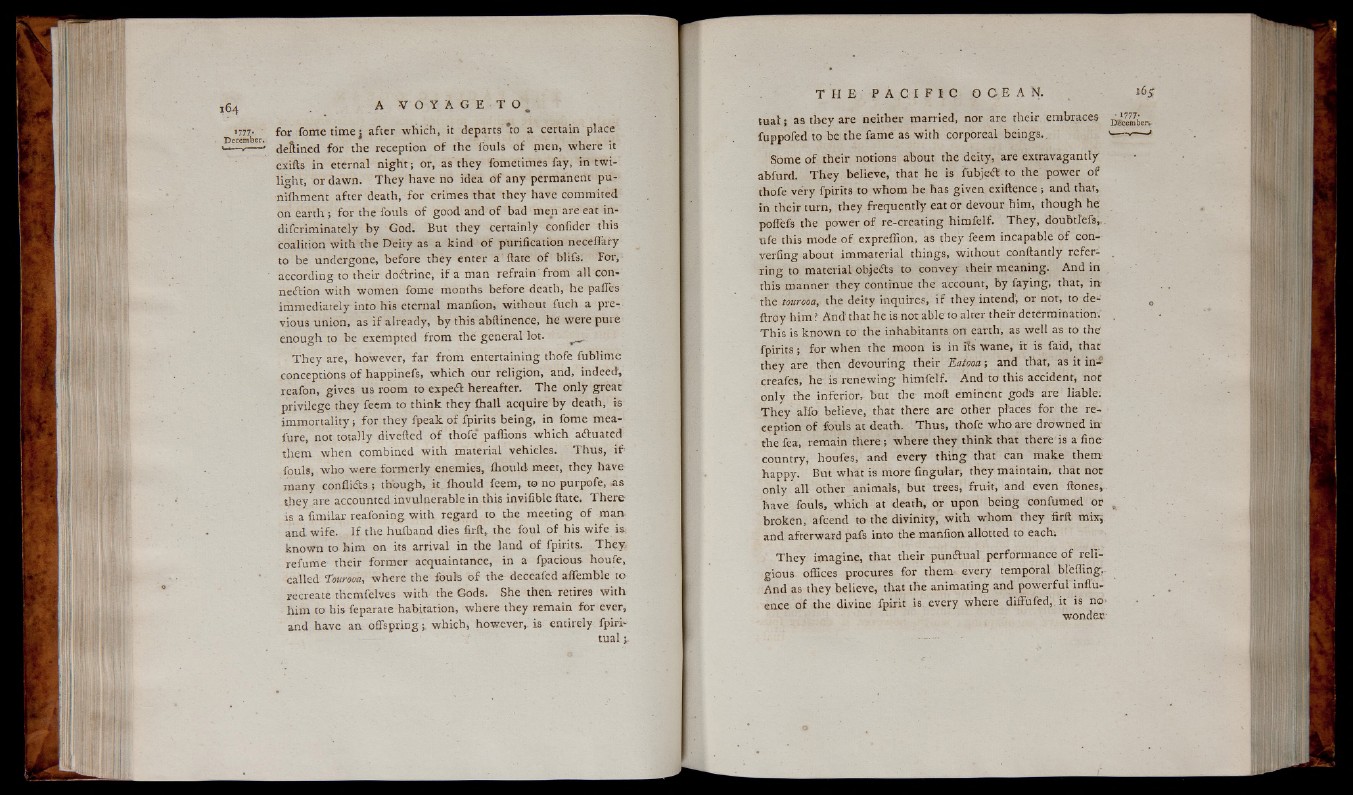
>777- fo r fome time j after w hich, it departs *to a certain place
*•*—^ — ’ d e fin ed fo r the reception o f the fouls o f men, where it
exifts in eternal n ig h t ; or, as they fometimes fay, in twiligh
t, or dawn. T h e y have no idea o f any permanent pu-
nifhment after death, fo r crimes that they have commited
on e a r th ; for the fouls o f good and o f bad men are eat in-
difcriminately b y God. But they certainly confider this
coalition with the Deity as a kind o f purification necefiary
to be undergone, before the y enter a ftate o f blifs: For,
according to their doflrine, i f a man re fra in 'from all conn
e x io n w ith women fome months before death, he pafles
immediately into his eternal manfion, without fuch a previous
union, as i f already, by this abilinence, he were pure
enough to be exempted from the general lot.
T h e y are, however, fa r from entertaining thofe fublime
conceptions o f happinefs, which our religion, and, indeed,
reafon, g iv e s us room to expedt hereafter. T he only g rea t
privilege they feem to thin k they fhall acquire b y death, is
im m o r ta lity ; fo r they fpeak o f fpirits being, in fome mea-
fure, not totally diverted o f thofe* paffions w h ich adluated
them when combined w ith material vehicles. T h u s , if
fouls, who were formerly enemies, ihou ld meet, they have
many conflicts ; though, it ihould feem, to no purpofe, .as
they are accounted invulnerable in this invifible ftate. T h e re
is a fimilar reafoning with regard to the meeting o f m an
and wife . I f the huiband dies firft, the foul o f his w ife is,
known to him on its arrival in the land o f fpirits. They,
refume their former acquaintance, in a fpacious houfe,
called Tourooa, where the fouls o f the deceafed aifemble to
recreate themfelves with the Gods. She then retires with
him to his feparate habitation, where they remain for ever,
and ha ve an offsprin gs which, however, is entirely fpiritu
a l*
tu a l ; as they are neither married, nor are their embraces ¿ ¿ 7e^ en.
fuppofed to be the fame as with corporeal b e in g s .. '— W— *
Some o f their notions about the deity, are extravagantly
abfurd. T h e y believe, that he is fu b je fl to the power o f
thofe very fpirits to whom he has given exiftence ; and that,
in their turn, they frequently eat or devour him, though he
poffefs the power o f re-creating himfelf. T he y, doubtlefs,,.
ufe this mode o f expreffion, as they feem incapable o f con-
verfing about immaterial things, without conftantly refer- .
rin g to material ohjedts to convey their meaning. And in
this manner they continue the account, by faying, that, in
the tourooa, the deity inquires, i f they intend’, or not, to de- 0
ftroy him ? And1 that he is not able to a lter their determination. .
T h is is kn own to the inhabitants on earth, as well as to the
fp ir it s ; for when the moon is in its wane, if is faid, that
they are then devouring their Eataoa; and that, as it in—
creafes, he is ren ew ing himfelf. And to this accident, not
only the inferior, but the moft eminent gods are liable:
T h e y alfo believe, that there are other places for the reception
o f fouls at death. Thus, thofe who are drowned in
the fea, remain there ; where they think that there is a fine-
country, houfes, and every thin g that can make them
happy. But what is more Angular, they maintain, that not
only all other animals, but trees, fruit, and even ftones,
have fouls, which at death, or upon being confumed or „
broken, afcend to the divinity, with whom they firft mix,
and afterward pafs into the manfion allotted to each;
T h e y imagine, that their punctual performance o f religious
offices procures for them every temporal blefling..
And as they believe, that the animating and powerful influence
o f the divine fpirit is every where diffufed, it is no
wonder